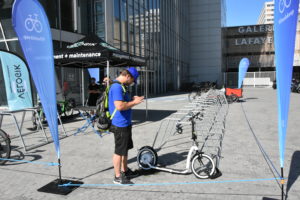Designing public space for versatile mobility
We are stepping into a new era built upon the in-depth analysis of public behaviour and the underlying social factors. Nowadays, the public space is increasingly shared amongst several types of users, with a growing number of bus and cycle lanes as well as the emergence of electric scooters, electrical unicycles and small autonomous delivery vehicles. There is therefore an overwhelming need to increase the number of bike parking spaces in the underused and out-of-the-way cracks of our towns and cities. We must also optimise the signage and identification of such areas and test new forms of shelters and services. Moreover, any extra parking spaces for dockless bikes can very much be used for private bikes (unlike docking stations, which can only be used by docked bikes!).

Given that the environmental, sanitary and social context demands a quick shift towards soft mobility, one key element is pinpointing and removing obstacles discouraging people from taking up cycling. And parking is precisely one of these obstacles. There is no shortage of bike parking solutions; we just need to deploy them more extensively. And we must always remember that like the bikes that use them, this infrastructure must also be maintained and cared for to provide a reliable and safe service.